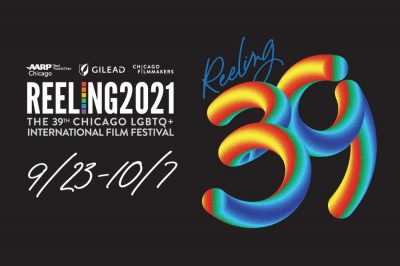
Reeling 39, Chicago’s International LGBTQ+ Film Festival, recently completed its 2021 edition in its first-ever hybrid format with both theatrical and virtual screening options. This flexible approach made it possible for viewers to screen a variety of films in the traditional manner or from the comfort of their own homes. While some of the presentations were available in Illinois only, both theatrically and virtually, many others could be streamed nationwide, making it possible for movie fans to see some excellent films without being in the Windy City, an increasingly popular viewing option for many film festivals (and one that I heartily applaud).
Thanks to this new format, I was able to screen a great number of films – 17 in all. And I can honestly say that the quality of the offerings was definitely upped this year (kudos to the programmers at Chicago Filmmakers). Below are my reviews of the releases I watched, some of which, like last year, truly had me … reeling.
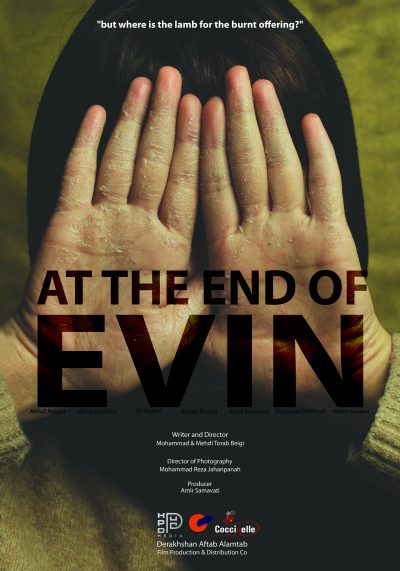
“At the End of Evin” (a.k.a. “Amen”) (Iran) (8/10)
When Amen (Mehri Kazemi), a transitioning young Iranian male seeking to surgically complete the gender reassignment process, is introduced to a wealthy, powerful, well-connected sponsor (Mahdi Pakdel), there is much hope for a new start in life. However, as soon becomes apparent, there are strings attached to this promised arrangement, the answers to which aren’t readily forthcoming and grow ever more cryptic and troubling with the passage of time. What exactly is going on? That’s what this creepy but mesmerizing tale slowly discloses, growing progressively more unnerving with each passing frame, thanks in large part to the film’s inventive cinematography, which tells the story from the perspective of camera as unseen protagonist. In their debut feature, directors Medhi and Mohammad Torab-Beigi present a chilling story whose treatment echoes the chilling treatment that the Iranian transgender community is subjected to on an ongoing basis, leaving viewers with an incensed yet unsettling feeling by film’s end. While the course of some of the dialogue may seem meandering and hard to follow, it’s all part of the well-concealed mystery that’s unfolding before the audience’s eyes, something that becomes more apparent the further viewers get into the story. An auspicious start for a talented emerging directorial duo. Full review to follow.
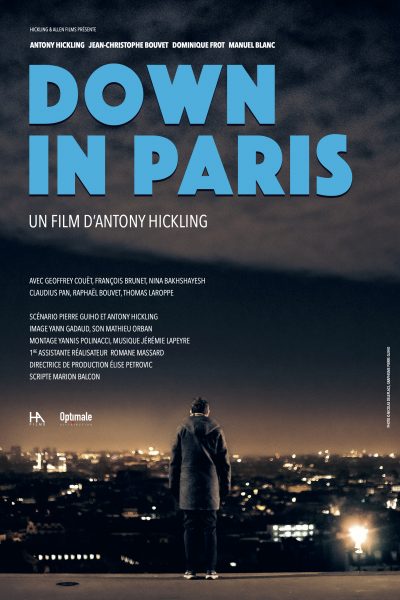
“Down in Paris” (France) (8/10)
Finding ourselves is something we all must do, including members of the LGBTQ+ community, who must ultimately discover themselves in areas of their lives other than their sexual orientation. Such is the case in writer-actor-director Antony Hickling’s introspective character study about a frustrated filmmaker (Hickling) who walks off the set of his latest picture and spends the night wandering the streets of Paris. During this colorful and sometimes-surreal odyssey, he engages in a series of planned and chance encounters with an array of others, including friends, a former partner (Raphaël Bouvet), a Tarot card reader (Dominique Frot) and a host of strangers, all of whom nudge the protagonist into taking an honest look at himself, his life, his past and his future, a revelatory and rejuvenating experience in many regards. I applaud this release for taking a wider view of life in which a gay lead character is pushed into focusing his energies on addressing issues other than his orientation and lifestyle. While the pacing lags a bit in a few sequences, the film does an otherwise-fine job of keeping the narrative moving and engaging without lapsing into dry, protracted talky scenes that weigh down the work. An impressive offering that does much to expand the scope and perspective of what constitutes gay cinema. Sensitive viewers should be aware the picture contains some sexually explicit content. Full review to follow.
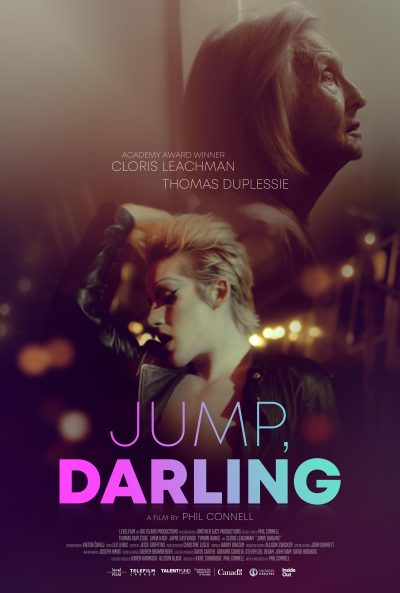
“Jump, Darling” (Canada) (8/10)
When an aspiring actor (Thomas Duplessie) who has trouble landing roles starts settling into a new routine as a drag queen, the decision does not set well with his button-down control freak boyfriend (Andrew Bushell), prompting him to leave behind life in Toronto and take off for a visit to his aging and increasingly feeble grandmother (Cloris Leachman) in rural Ontario. Getting some distance thus provides him with an opportunity to shuffle his priorities and to draw from the no-nonsense wisdom of “grams.” It also enables him to explore new artistic options and love interests, as well as to confront longstanding issues with his loving but overbearing mother (Linda Kash). Director Phil Connell’s debut feature may meander a bit at times, but its heartfelt sentiments and sage advice about being willing to take a leap of faith, no matter what the endeavor, will resonate with viewers who have taken – or who need to take – steps aimed at pushing the reset button in their lives. The film is particularly noteworthy as the final screen performance of Cloris Leachman, who is positively superb in the role of the insightful matriarch, capping off a storied career in an auspiciously fitting way, a portrayal sure to tug at the heart strings without being manipulative in doing so. This delightful offering holds universal appeal for anyone who has ever had to go through a difficult transition in search of a way to start over and come out looking like a queen. Full review to follow.
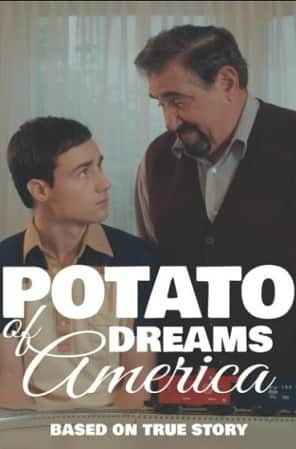
“Potato Dreams of America” (USA) (8/10)
Imagine an episode of the original iteration of “The Wonder Years” (including one of its legacy cast members) with a gay, Russian, Perestroika Era twist directed by flamboyant, colorfully whimsical filmmaker Wes Anderson, and you’ve got an idea what this autobiographical dark comedy is all about. Director Wes Hurley’s second feature playfully chronicles his often-challenging upbringing in the twilight of the Soviet Union and the hopes that his on-screen alter-ego, “Potato” (Hersh Powers), and his mother (Sera Barbieri) shared of immigrating to America to enjoy its many freedoms. That dream comes true when mom signs up to become a mailorder bride, enabling the duo to relocate to Seattle and begin a new life. Those hopes get put to the test, however, as the now-older pair (Tyler Bocock, Marya Sea Kaminski) deals with an overbearing husband and stepfather (Dan Lauria) who threatens to send them back to Russia if they disobey his rigid, reactionary wishes. That becomes an especially menacing threat as Potato tentatively wrestles with his emerging gay sexuality, a prospect his new dad sees as wholly unacceptable, an attitude that the young man left Russia to escape. Told with an inventive mix of fantasy, realism, and an array of twists and turns, as well as the presence of a hip but often-clueless Jesus (Jonathan Bennett) as Potato’s personal muse, this delightful offering is full of laughs and heartwarming moments but without becoming cheesy, overly sentimental, or, above all, predictable. The transitions in storytelling styles can be a bit jarring at times, but the overall mix blends well, serving up a funny, endearing and enjoyable time at the movies.

“Firebird” (Estonia/UK) (7/10)
What begins as a prototypical forbidden gay romance – the kind that has been done many, many times before – successfully manages to redeem itself by embedding its story in a larger context. Director Peeter Rebane’s debut feature tells the story of a Soviet air force pilot (Oleg Zagorodnii) and a private (Tom Prior) assigned as his aide who fall in love during the Cold War and subsequently become caught up in a complex love triangle with a female colleague (Diana Pozharskaya), all the while under the intrusive scrutiny of the KGB. The handling of the fact-based narrative is admittedly somewhat melodramatic and formulaic, but the film’s heart is decidedly in the right place, evoking genuine emotive sentiments. What’s more, the picture effectively places the primary story thread in a historical and social context in which elements other than the romance play integral roles, particularly in terms of how they affect the unfolding of amorous developments. The result is an engaging offering, one that’s highly affecting emotionally and poignantly draws attention to the plight of a persecuted minority discriminated against by an intolerant authoritarian regime, one whose past prejudicial tactics still echo to this day.
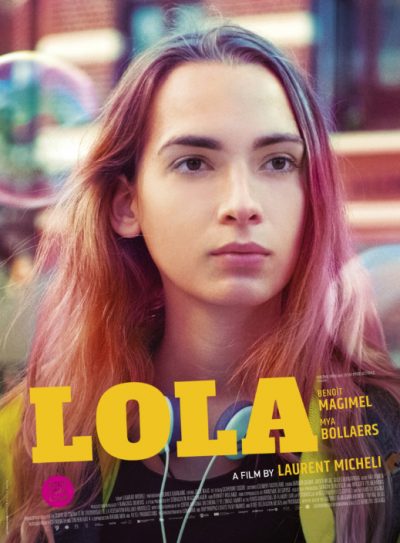
“Lola” (“Lola vers la mer”) (Belgium/France) (7/10)
Significant and dramatic life events often make for strange affiliations. So it is in this intensely moving, often-outrageous road trip tale of a pre-op transsexual (Mya Bollaers) and her estranged father (Benoît Magimel) when it comes time for them to travel to the seaside childhood home of their deceased wife and mother to scatter her ashes. Their stormy journey is replete with a series of arguments, revelations, flashbacks and reconciliations, along with a touch of the surreal and subtle but undeniable hints of otherworldly intervention to facilitate peace between the quarreling parties. Some elements of the story are admittedly predictable, and portions of the second act tend to lag a bit at times, but director Laurent Micheli’s offering also takes some unexpected and deliciously intriguing twists and turns in getting viewers to the film’s destination, punctuated by a crisp screenplay loaded with biting, no-holds-barred dialogue, incisive insights, and more than a few genuinely heartfelt moments. This touching Belgian/French co-production is a delightful, affecting watch that, while not entirely wholly original, nevertheless comes across as a warm, feel-good story without ever becoming schmaltzy, manipulative or saccharinely sentimental. Bravo, “Lola”! Full review to follow.
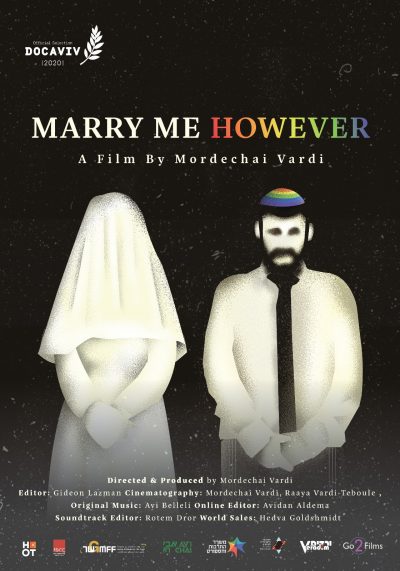
“Marry Me However” (Israel) (7/10)
Most of us would probably agree that marrying against one’s will for the sake of rules and appearances is destined to fail. So it has been for a number of closeted gay Orthodox Jewish men and women who obediently followed the “advice” of their religious leaders by marrying and having children in full knowledge of their true sexual orientation. But what happens when those relationships eventually dissolve? That’s what Mordechai Vardi’s fine documentary explores through interviews with formerly wed gays and lesbians, their onetime partners, and the religious leaders whose indefensible and erroneous counseling seriously disrupted their lives and those of others facing similar circumstances. While the film is somewhat on the short side at a scant 63 minutes, it nevertheless evokes an array of emotional responses, from sadness and sympathy for those left behind to supportive joy for those who had the courage to take their next step to angry indignation over the bestowing of bad advice to those who truly knew better and turned a blind eye. Most of all, though, the film encourages all of us to find our own answers for our lives rather than blindly follow the ill-conceived recommendations of those seeking to preserve outdated attitudes simply for the sake of preserving an antiquated status quo.
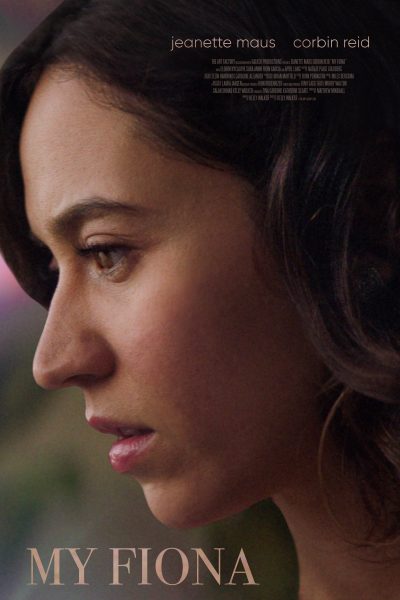
“My Fiona” (USA) (7/10)
Those left behind in the wake of a loved one’s suicide often struggle to cope with their feelings and attempts at healing, especially when the death comes unexpectedly. These are the circumstances faced by the wife (Corbin Reid) and young son (Elohim Nycalove) of a woman (Sara Amini) who kills herself without warning. As the survivors attempt to pick up the pieces, they increasingly draw upon the support of the victim’s best friend (Jeanette Maus), a life-long companion, confidante and business partner who gradually ingratiates herself into the lives of the grieving family members, a relationship that simultaneously becomes ever-more intimate yet intensely strained. Director Kelly Walker’s debut feature is a generally touching affair, despite occasional bouts of over-the-top melodrama and a few questionable plot choices, sensitively telling a story that none of us should have to face. The fine ensemble cast and largely authentic writing lend themselves well to this emotive production, successfully avoiding the traps of becoming manipulative or overly sentimental, clichés that are easy to fall into with material like this. A fine first effort from a new directorial talent.
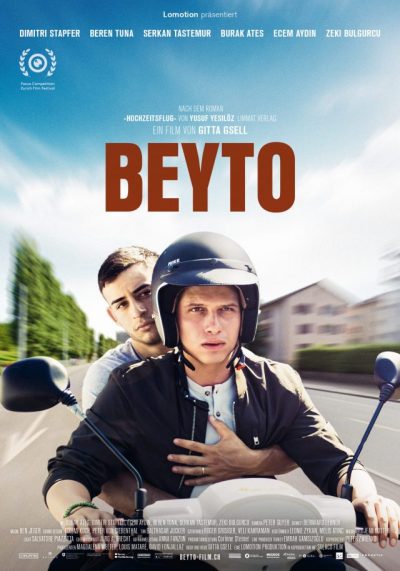
“Beyto” (Switzerland) (6/10)
When a young gay Turkish emigre (Burak Ates) living with his family in Switzerland is unwittingly railroaded into a secret arranged marriage while on a visit to the rural village where he grew up, he’s forced into complying with the wishes of his parents (Serkan Tastemur, Beren Tuna) and setting his own dreams aside. Needless to say, that doesn’t go over well with his Swiss boyfriend (Dimitri Stapfer), who’s furious upon the cajoled bridegroom’s return. So what’s next? That’s what the members of this unconventional love triangle must now try to figure out. While director Gitta Gsell’s latest may have its heart in the right place – especially when it comes to stoking viewer indignation in response to the antiquated, unenlightened cultural considerations allowed to unduly dominate the lives of three young people perfectly capable of making their own choices – the predictable, formulaic narrative and its glib, feel-good vibes undercut the credibility of events. The notion of genuinely seeking workable solutions to thorny conditions is undoubtedly laudable, but, when it comes at the sake of believable realism, that often wipes out whatever sympathetic sentiments a story like this may have worked so hard to engender. This is passable viewing, to be sure, but it’s a little too neat and tidy in my view in light of the film’s prevailing circumstances.

“The Greenhouse” (Australia) (6/10)
It’s a rare but truly pleasant surprise when a film about the paranormal treats its material more with a sense of wonder than horror. And, thankfully, that’s what this Australian romantic and heartfelt fantasy does – for the most part. Director Thomas Wilton-White’s debut feature tells the story of a young woman (Jane Watt) dealing with loves that were and that might have been while also working through profound grief over the loss of one her mums (Rhondda Findleton) and the frustration of letting that death hold her back in her own life. Those issues are raised when she discovers a mysterious portal in a greenhouse on her family’s sprawling rural property, one that whisks her away to an otherworldly dimension in which she’s able to re-experience incidents from her past from a third-person perspective, giving her a new outlook on why her life has unfolded as it has. This is a genuinely refreshing take on stories of this nature – that is, until the film needlessly incorporates ill-considered frights that undermine the narrative and sabotage the overall character of the picture. While an argument could be made in support of the inclusion of these plot devices, it seems that the purpose behind their presence in the story could have been handled differently and more effectively, especially when it comes to keeping in line with the character of the film. Introducing out-of-place scares in an otherwise-mystical, emotional narrative just seems like lazy writing and inappropriate filmmaking. Had the director taken another course rather than resort to trite story elements, this would have been a true gem of a movie rather than just another mediocre genre offering.
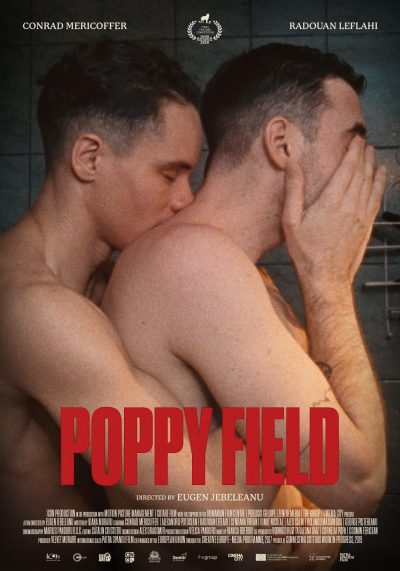
“Poppy Field” (“Câmp de Maci”) (Romania) (6/10)
Based on actual events, this tale of a closeted Romanian policeman (Conrad Mericoffer) who is assigned to quell a protest by ultra-conservative fundamentalist Christian homophobes over a Bucharest movie theater’s screening of a gay film escalates in intensity when the officer is confronted by a former fling (Florin Caracala) who’s attending the show. In a country where being openly gay is still uncommon, it’s difficult for those who work in prejudiced, über-macho professions to successfully retain their cover, as this uncomfortable protagonist knows all too well, a challenge made more difficult by the inflamed circumstances he now faces. This setup thus provides the makings of a confrontational scenario full of dramatic potential, especially given that this situation is unfolding on a weekend when the gendarme’s Parisian boyfriend (Radouan Leflahi) is paying a visit. Unfortunately, first-time feature director Eugen Jebeleanu doesn’t tap into this rich vein of material as effectively as he might have. While the film presents the central conflict with a great degree of palpable realism, the script feels underdeveloped, with scenes that are somewhat repetitive and that fail to explore all of the narrative possibilities available. The same is true of the relationship story thread, which dominates the film’s opening act yet often feels more plodding than enlightening and is virtually ignored further on in the film. And, to top it all off, the picture’s conclusion feels unresolved, conveying a sense of resignation that, while sadly realistic, nevertheless comes across as wholly unfulfilling. “Poppy Field” truly had a lot going for it going in, but, regrettably, the blossoming of this story ultimately feels arrested in mid-flower.
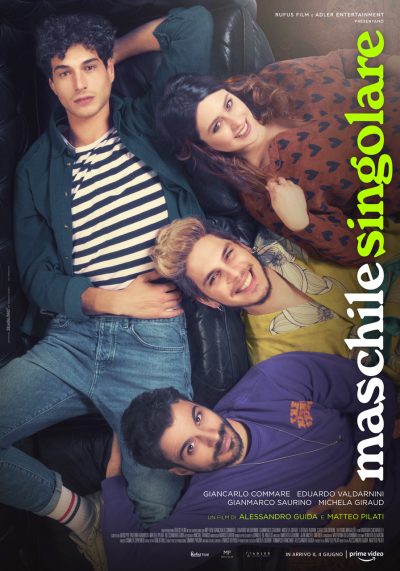
“Mascarpone” (“Maschile singolare”) (Italy) (5/10)
Getting dumped by one’s partner is never easy, especially if you’ve never really been independent enough financially or emotionally to survive on your own. That’s especially true when it comes to the challenges of starting over. Such is the fate of the protagonist (Giancarlo Commare) in this gay Italian rom-com whose narrative is essentially the story line straight out of Paul Mazursky’s classic “An Unmarried Woman” (1978) only with a same-sex twist. The problem here, though, is that the meandering nature of this take on the story, coupled with elements that feel like they were plucked from an insipid Hallmark Channel romance, don’t blend particularly well, making for a viewing experience that often wanders and in sappy, predictable ways. Directors Alessandro Guida and Matteo Pilati have put together a film that’s not terribly original and many of whose elements feel like they were thrown together, as if assembled by a committee. While this release effectively captures what it’s like for many gay men in the singles dating scene these days, that’s not enough to save a project that truly could use some significant retooling to hit the mark better.
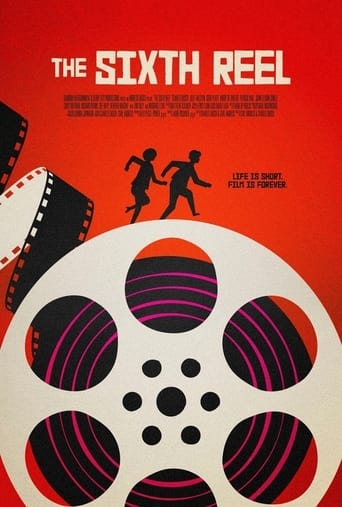
“The Sixth Reel” (USA) (5/10)
Web site, Trailer
Fewer things are more painful to watch than a movie that thinks it’s funny that genuinely isn’t. Case in point: this campy, wannabe-zany comedy about a movie memorabilia dealer (Charles Busch) who comes into possession of what’s believed to be the last-surviving copy of the enigmatic Lon Cheney silent film “London After Midnight” (1927) and subsequently seeks to peddle it to a willing buyer as he’s pursued by eager thieves attempting to steal it. What should have been a screwball comedy flying by at breakneck speed, however, is instead a laboriously paced snooze with hammy overacting, lame humor, and an overall vibe reminiscent of a bad drag show full of trite jokes, endless clichés, predictable plot devices and ubiquitous gay stereotypes. The film attempts to redeem itself somewhat in the final half-hour with a drastic change in tone to a more dramatic narrative, material that’s handled well, albeit largely unexpected. Unfortunately, the die is cast by that point, and this shift is far from enough to save this failed effort. Writer-directors Carl Andress and Charles Busch are capable of delivering better, and it’s a shame they didn’t do so here.
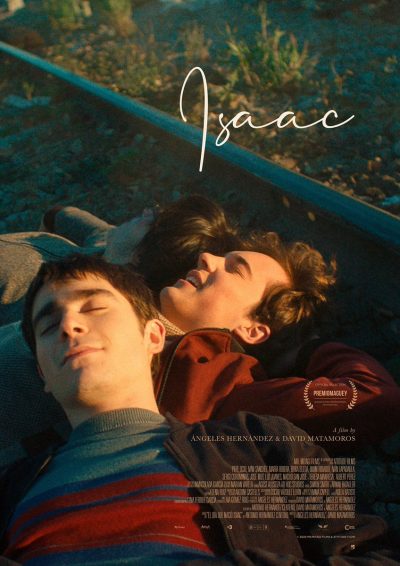
“Isaac” (Spain) (4/10)
Take a group of selfish, sexually insecure characters, put them in a story with long-simmering, unaddressed regrets and the search for rationalized, self-serving desires, and you’ve got this meandering, lackluster Spanish melodrama in which it’s virtually impossible to develop any interest in, or sympathy for, all concerned. This tale of misguided, unbridled ambition and sexual gamesmanship has difficulty establishing its focus, and, once it does, viewers are likely to find the characters’ motivations and actions unsavory and/or ruled by poor judgment. And, by film’s end, audiences will probably find them to be woefully pathetic – and not especially deserving of our empathy. In their feature film debut, co-directors Ángeles Hernández and David Matamoros fail to generate much of a connection between viewers and the players on screen, leaving many of us to wonder why we should care about them or their circumstances, essentially rendering the whole affair pointless. And that, unfortunately, about sums it up where “Isaac” is concerned.

“Baja Come Down” (USA) (3/10)
What’s billed as a Baja California road trip tale whose purpose (and metaphorical narrative) is to determine the future of a lesbian relationship that’s on the rocks is, in fact, a long, drawn-out, pretentious slog that plays more like a student film project than a bona fide theatrical release. Director Anderson Matthew’s 78-minute film seems much longer than it actually is, because viewers are more likely to pay more attention to their watches than to what’s happening on screen. Aside from some nice cinematography and a few modestly engaging scenes, this offering does little more than serve up an examination of lesbian relationship dynamics, a scenario that’s been done many times before – and better. It’s particularly difficult to muster up much sympathy for the film’s whiny, indecisive protagonists (Caitlin Michael Riley, Michelle Ortiz), whose feelings for one another seem to vacillate repeatedly, stretching out events in the run-up to a conclusion most everyone is unlikely to care about by the time the end is finally reached. Don’t sign up for this trip – you’ll be glad you stayed home.
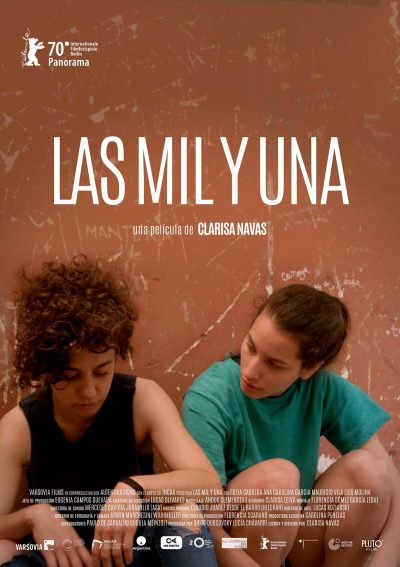
“One in a Thousand” (“Las Mil y Una”) (Argentina/Germany) (3/10), Rotten Tomatoes (*+)
Coming of age is often a confusing time for anyone but especially for those who are unclear about their sexuality. Such is the case for a group of teens living in a run-down Argentine housing project called “the One Thousand,” particularly for an inexperienced 17-year-old innocent (Sofia Cabrera) who begins falling for a 20-year-old (Ana Carolina Garcia) with a past and a reputation. While director Clarisa Navas’s second feature attempts to tells its story as “naturally” as possible, presenting its cast members as “individuals” rather than “characters,” this approach unfortunately falls prey to a story line littered by an excess of extraneous material, including lengthy conversations about incidental subjects, pointlessly long lingering shots, and bloated cinema verité sequences of the protagonists engaged in mundane activities like walking, running or staring off into space. The result is an offering that frequently tries viewer patience, especially in the first hour. While the picture shows some signs of life in the second half, that’s not nearly enough to save this boring morass of a movie, one that’s been receiving undeservedly high praise for those who believe this is art when it is, in fact, unadulterated tedium.
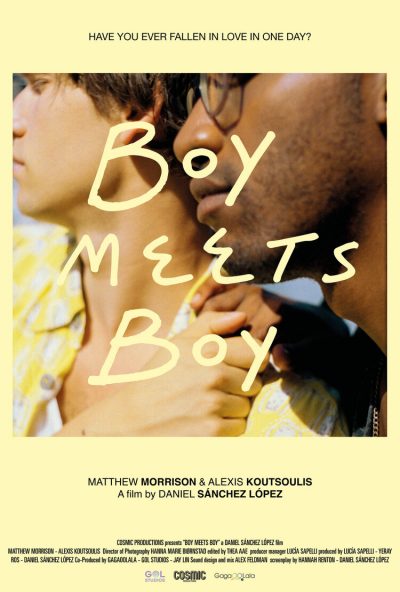
“Boy Meets Boy” (Germany) (2/10)
More aptly titled “Bore Meets Bore,” everyone knows where this one is ultimately headed, yet it tries desperately to make itself out to be more than it really is. As a cross between a chance meeting/gay whirlwind romance and elements of the “Before Sunrise”/”Before Sunset” filmography (with bits of “My Dinner with Andre” (1981) thrown in), director Daniel Sánchez López’s talkfest between two gay men (Matthew James Morrison, Alexandros Koutsoulis) who meet on a nightclub dance floor and spend the following day on a walking tour of Berlin is merely a hedge that puts off the inevitable hook-up between the two ships in the night (or day, if you prefer). The picture tries hard to convince viewers that the protagonists are falling in love, but there’s precious little indication of that in light of the general lack of chemistry between them, with much of their dialogue consisting of cheeky flirting and pretentiously “deep conversation.” Given the cinematic destination that’s visible from miles away, the discourse that precedes it adds nothing to the film other than lubrication for the gears that are grinding away for almost an hour before the participants finally decide to get down to the business that everyone knows they’re headed for. And, while the sex is tastefully and sensitively filmed, this is really little more than very, very soft core gay male erotica dressed up as art, much in the tradition of the “Emmanuelle” movies. Yawn city on all fronts, to be sure.
Copyright © 2021, by Brent Marchant. All rights reserved.

No comments:
Post a Comment